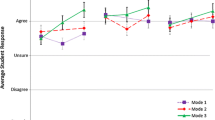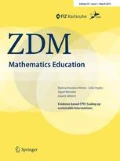Abstract
In this interview we asked Paul A. Kirschner about his comments and reflections regarding the idea to apply cognitive psychology-based instructional design principles to mathematics education and some related issues. With a main focus on cognitive psychology, educational psychology, educational technology and instructional design, this internationally well-known scholar reflects on the work conducted within the mathematics education community. This paper presents a summary of the comments and reflections that he expressed during the interview. A first main theme relates to the general idea behind the special issue, i.e. the feasibility of applying cognitive theory-based instructional design principles in the field of mathematics education. Second, the interview related to the set of instructional design principles that were included in the special issue and those that were omitted. Third, reflections are made on the differences between the application of instructional design principles in mathematics education research and in instructional design research more generally. One main idea running through this interview is that, according to Kirschner, mathematics education research is not necessarily a special field in its own, as the variation of instructional goals and of research foci within mathematics education is at least as large as the variation across different content domains.
Similar content being viewed by others

References
Kirschner, P. A., Sweller, J., & Clark, R. E. (2006). Why minimal guidance during instruction does not work: An analysis of the failure of constructivist, discovery, problem-based, experiential, and inquiry-based teaching. Educational Psychologist, 46(2), 75–86.
Noroozi, O., Kirschner, P. A., Biemans, H., & Mulder, M. (2017). Promoting argumentation competence: Extending from first- to second-order scaffolding through adaptive fading. Educational Psychology Review (online).
Shulman, L. S. (1986). Those who understand, knowledge growth in teaching. Educational Researcher, 15(2), 4–14.
Van Merriënboer, J. J. G., & Kirschner, P. A. (2017). Ten steps to complex learning (third edition). New York: Taylor & Francis.
Author information
Authors and Affiliations
Corresponding author
Rights and permissions
About this article
Cite this article
Kirschner, P.A., Verschaffel, L., Star, J. et al. There is more variation within than across domains: an interview with Paul A. Kirschner about applying cognitive psychology-based instructional design principles in mathematics teaching and learning. ZDM Mathematics Education 49, 637–643 (2017). https://doi.org/10.1007/s11858-017-0875-3
Accepted:
Published:
Issue Date:
DOI: https://doi.org/10.1007/s11858-017-0875-3



